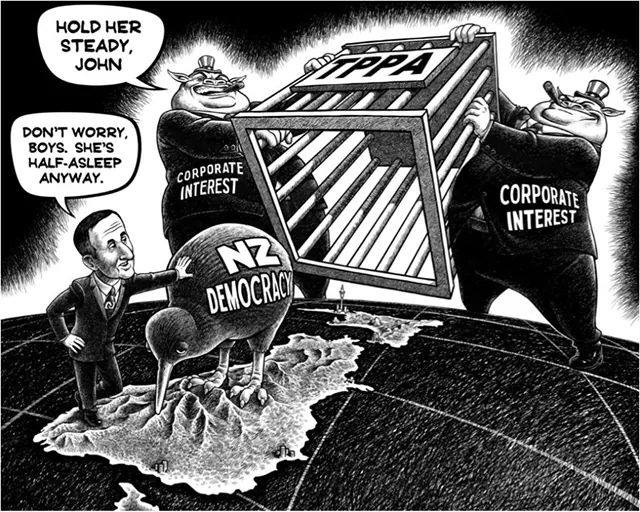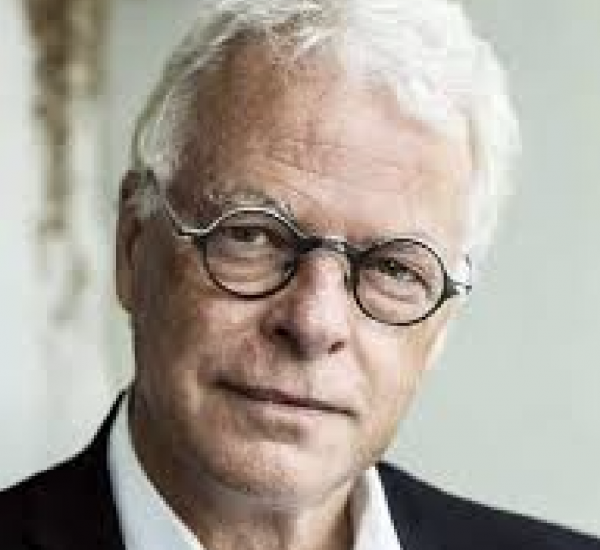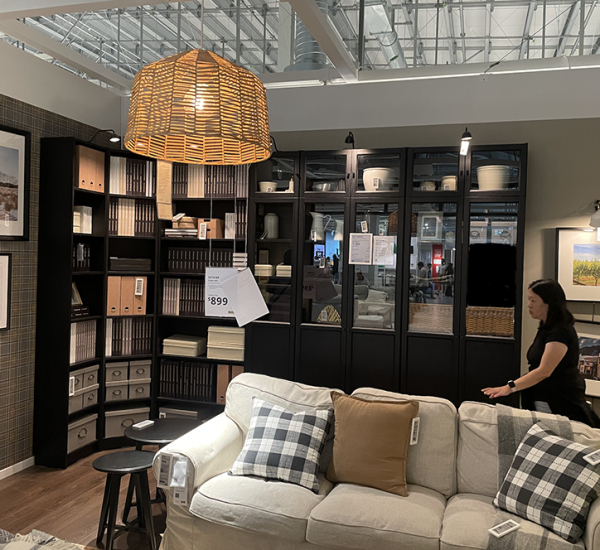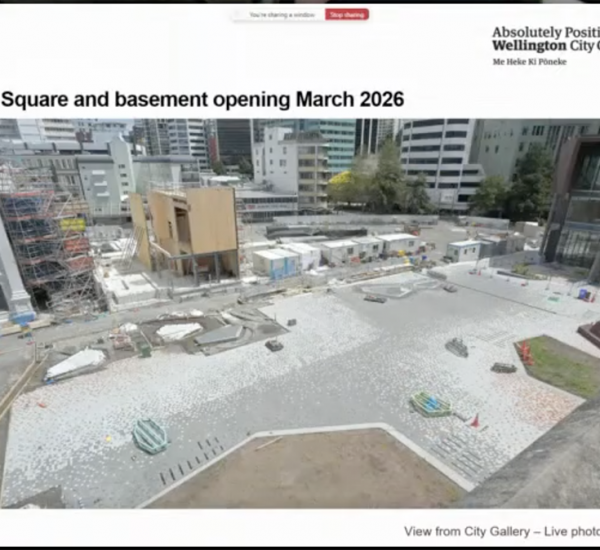It was a cold, wet day in September, and the clocks were striking thirteen. A freezing, damp front spread through the country, blanketing the land with wave after wave of wind-chilled moisture, soaking into the ground where soil remained uncovered by asphalt. It soaked too into the clothing of those that ventured out, wool-blends steaming gently when they reached the comfort of indoors again. The rain is always welcome in the country, plumping the soil, lubricating the fatness of the worms, and providing the goodness so that the sheep and cattle can eat, endlessly, fattening their bodies for slaughter. Farmers feed out cautiously, little need for extra sustenance in these conditions, checking that their flocks are active and not feeling the cold. For some reason, farmers always vote for the boys in blue, in every sense. They vote for law and order and for full fat milk prices. They vote for Fonterra and vote for Key. They vote for themselves and for the continuation of the New Zealand lifestyle, for control of the land, for a new Holden ute outside the farm gate at Christmas.
It’s different in the cities, or at least it used to be. While the countryside lay blue, resplendently cloaked in a mantle of wool-clip payouts and now milk-fat receipts, the cities always had a strong coating of red. Red for the unions, for the workers in the factories, for those that live as part of the industrial machine. Red for the cities where there was a university within the city walls, both in terms of the vibrant, violent student body politic, raging against the system; red too in terms of their teachers, who had read too much and knew the truth behind the figures: that wealth does not trickle down. Red was the colour of the workers, the colour of the young, the dispossessed, the people who felt that it wasn’t right. Red was the lifeblood of the people, sometimes spilling out onto the land in hard fought battles against the state’s authority. But not any more.
The colors have changed now. New Zealand, Aotearoa, the land of my ancestors, the home of my people: New Zealand has changed now. Once a country where smarminess was disliked, where underhanded ness and backhanded ness were unknown terms, where blue was blue and red was red, this country is multi-coloured now. A strong tinge of green permeates the core of our nation. It’s not the dark, sullen green of the native bush, that dusky grey green of the undergrowth that our flightless birds mimic, nor the verdant green of lush grassy meadows filling cows with milk. Instead it’s a rich green, not greeny-blue nor tinged with red, but green for Green’s sake, concentrated pure green that focuses on the need for the land to heal after years of neglect. Other colors run through here too: a tiny streak of purple, like a bouffant hairdo, flecks a painting in northern suburbs. A black and silver flag flies high, gold card glittering in the very definitely fading sunshine. It’s the last stand for the deeply chiseled lines that carve the moko in the face of its founder, eyes winking with mischievous delight. The persistent light blue colour that shows its face, unfurls a flag and flaps wildly, then folds, gently, back into oblivion again till the next time. And a tiny flash of black and red, that flashed so brightly and so quickly, like the russet underside the wings of a kaka as it flies towards the feeding station in Zealandia, but this time the red and black has been snuffed out. One minute it is there, the next it is gone, all light extinguished as if it has been sat on by a pair of overly large buttocks, clad in lederhosen perhaps.
The new waves of immigrants have changed the mix once again. Aotearoa is made from immigrants, there is no native species here apart from the birds and the trees. Indeed: our birds are unique, found nowhere else on earth, and fragile for that. They called us Birdland once, the sound of species avian so plentiful that it kept Cook and his men awake, as they anchored a quarter mile offshore to escape the deafening sound of the dawn chorus from our feathered friends. No longer: the forests are silent now. We’ve cut down the forests so that humans can thrive: the timber long wasted away. Mighty kauri and totara forests, exported abroad, reduced to planks, reduced to smoke. The tall and noble kahikatea reduced to butter boxes, sent to England in thin planks 18 inches long, packed with congealed fatty breast milk byproducts from the udders of our faithful four legged captives. The rimu forests, once plentiful, now sliced and diced and spliced into the homes that spread across the countryside, slowly rotting away as studs and dwangs corrode over time. But our mammal species are just clones from elsewhere, some doing better here than others. Cats, dogs, sheep, horses, cattle: all seem to thrive here. Humans too, to a limited extent. Rats and mice, weasels and stoats, rabbits and other furry vermin, they all seem to relish this jungle-clad land we share. No natural food chain to keep them in check: it’s a wonder that foxes and wolves weren’t introduced as well, to keep the other species in check. Perhaps they were: perhaps a lone wolf really does still tread the shores, a black panther in Geraldine, or a jackall perhaps, snapping at the feet of the retreating immigrants.
I’m not sure what our most recent immigrants make of New Zealand, this strangely hypnotic land of ours. So quiet and sleepy this morning, no noise from outside. No cheering in the streets, just business as usual. Nothing changes. Everything stays the same. Our northernmost city is immigrant-central, awash with a tide of people who speak a wave of languages from countries far away. Last week I was in Auckland, and I took a bus: there was not a Pakeha face nor a Maori face to be seen. All the occupants were immigrants: from China, from India, from the Philippines, from the Islands, from the Middle East. I felt, truly, like a Fish out of water. We don’t notice that so much in Wellington, where our populations are perhaps more mixed, where taking a bus is not the sign of a recent arrival who can’t afford a car, but instead it is the sign of the established, who probably owns a car but knows that it is better for everyone if they don’t use it for commuting. But the immigrants in Auckland are intent on not using buses for long. They know that if they work hard, they will soon be able to buy a car, to buy a house, to buy a plot of land, and to drive to work. To vote for that nice John Key. The New Zealand dream: a house in the suburbs. A white picket fence. Green grass front lawn. A half-gallon, quarter-acre, pavlova paradise dream. Except that that particular dream died many years ago. But shush, don’t tell anyone.





This post appears to have got some people stumped. That’s ok – not everyone has to be (what is the opposite of stumped? Unstumped?) happy with a piece of writing / prose / drivel / angst / Sturm und drang gestalt….. Personally, I’m stumped by people voting National again, and was trying to express my unease. Grant Robertson, an all-round nice guy if ever there was one, got in with a decent majority as the Wellington Central electorate MP, but on the party votes for Labour in Wellington Central, it seems that more people voted for National. What is with that? Huh? I really don’t understand.
But also, the next time someone from Dorkland complains about “Wellington” running the country, I think I will just punch them in the face. John Key: lives in Auckland. National Party: based in Auckland. Murray McCully: Auckland. Stephen Joyce: Auckland, I believe. Cameron Slater: lives in Auckland, under a rock somewhere. Kim Dot Con: biggest goddam house, in Auckland. I mean seriously, if you want to blame anyone for New Zealand and its pathetic state of mind, blame Auckland.
Both elegaic and elegant Max, awash with pathos
Hello. My name is Star and I’m an Aucklander.
It has been 8072 days since I last lived in Auckland. I have cards from Aro Video, Moore Wilsons and the Wellington Public Library in my wallet, but on days when Wellington plays Auckland I secretly wear blue and white striped socks. Mind you, when the Hurricanes play the Blues I couldn’t care less.
When I am in Auckland I stick up for Wellington – especially to Auckland Transport bloggers. When I am in Wellington I stick up for Auckland. It gets a bit much sometimes, but at least I don’t have to justify Jerry Brownlee to anybody.
Thanks guys, appreciate your comments. I’m ok now. I listened to that nice Mr Key on that nice Mr Campbell’s tele program, and I feel better now…
Dont be seduced by Key’s dulcet tones. Jason Ede may have gone, but there is still plenty of bad taste policy to come. Charter Schools? Although ACT is essentially gone, charter schools are still on the agenda – nobody knows why. Expect Parata to implement more of them. RMA reform? Stated by National before that the RMA will be in their sights, so expect it to be lined up for a hefty revamp. Removing the clause about the Environment could do the trick. More Roads? Joyce gets to have everything his way in the next 3 years – he will be rewarded for the fantastic effort he made in ramming home a National Party win last week. He is the true brains behind the entire Nat movement. Asset sales? If they could think of anything else that cold be sold off, they would, although Key and English had pretty much already sold off everything and promised not to sell off more after last time.
Before the election – politics had me interested – even energised…
..now it has me depressed… the people of NZ (at least in the majority) have me depressed… Those that voted red then blue with the same pen – have me wishing they could wake up and look at what they are actually doing – what are they saying with that vote ! – on what earthly basis ! ! …
ACT – National sure … Green – Labour naturally… Mana – NZ first … weird but ok…
BUT National – Labour … WTF !
As to those that didnt vote at all and let this happen – again…
im depressed
Joyce does have a good eye for a wry guy…. take the stoush over Eminem’s music and the ensuing John Oliver piss-take:
The National Party campaign manager told reporters: “We think it’s, um, pretty legal.”
Oliver remarked: “I want to see that man as a defence lawyer.”
Today Joyce declined to expand on his comment that the use of the music was “pretty legal”.
“We’ll just leave that to the lawyers, I’m sure they’ll work it out,” Joyce said, adding that the piece “was very entertaining”.
He was vague about what “pretty legal” meant. “Pretty legal, it’s the same as pretty entertaining and pretty wallaby.”
In Wellington Central party vote : Labour + Greens > National. I don’t think this indicates people here voting for Grant as MP and John as PM.
Labour voters in Wellington Central (and other urban electorates), don’t necessarily see their electorate candidates as being particularly awful (or perhaps, at least, no more so than other candidates). But they are voting National or Green for party vote because of the godawful state of the Labour Party – it isn’t fit to run itself, let alone the entire country, and even ‘red’ supporters can see that. this is about competence rather than policy (a point also made, much better, over at DimPost btw).
And, I see that Labour is already confirming exactly why they didn’t deserve to form a government…
here: http://dimpost.wordpress.com/2014/09/23/inevitable-labour-pontification-post/
“Here’s something else I think Labour got wrong. They don’t understand the fucking electoral system. For the second election in a row they’ve run an FPP election focused on winning electoral seats and seen their party vote decline. They don’t seem to get that this is a problem. Josie Pagani, Mike Williams and Rob Salmond, who are the current official unofficial voices of the Labour Party have all heaped praise on Stuart Nash for winning Napier and Jacinda Ardern for coming close to winning Auckland Central. But Nash won Napier because the Conservative Party candidate split the right-wing vote, and in terms of party votes which is the only vote that matters Labour’s Napier vote fell by almost 1500 votes while Labour’s party vote in Auckland Central declined by over 3800 votes, one of the worst falls in the entire country. Poto Williams is the only Labour MP in the country who actually increased Labour’s Party vote in her electorate but for some reason Nash and Ardern are the ones getting talked up as future leaders. That’s bullshit.”
Inner city suburbanite:
Grant Robertson, (L): 16,102 votes
Paul Foster-Bell, (N): 9,557 votes
James Shaw, (G): 3,670 votes
but:
National Party 12,006
Green Party 8,627
Labour Party 7,351
I think this proves that people do not trust Labour any more…
http://www.nzherald.co.nz/nz/news/article.cfm?c_id=1&objectid=11329792
“The NZ Transport agency spent almost $11 million on Wellington’s $90 million Basin Reserve flyover before the project was shelved earlier this year.”
Max, I think what ICS was getting at was L+G > N
Taking it from your figures above 7351+8627 = 15,978 > 12,006.
M-D and Danyl are spot on though – Labour are now dunces at the MMP game. Somehow, the Greens also fell short this campaign, even though they excel at the party vote spruiking.
One thing the facts have laid bare is that Labour deserved to get well and truly porked. As said above, would this lot + minor parties cobbled together be a government you would really want, even if the alternative isn’t your favourite packet of crisps?
Well, that depends who takes the place as the “Leader of the Opposition” – last term it definitely seemed to be Russell Norman, but i see that old grizzly-face Winston Peters has put his proverbial virtual hat in the ring for this term… it will be interesting if Cunliffe steps up to the mark on that…